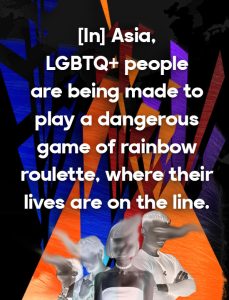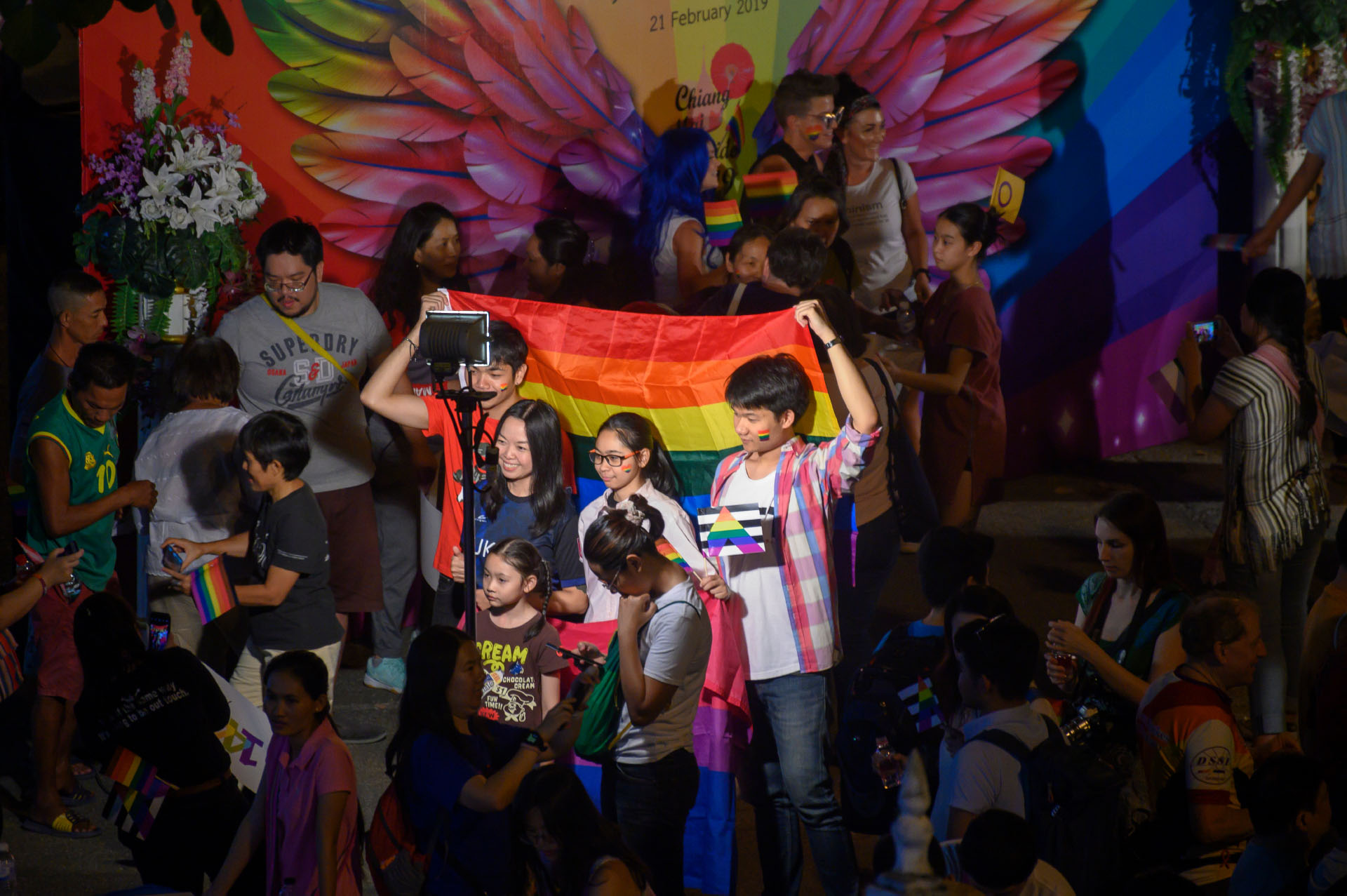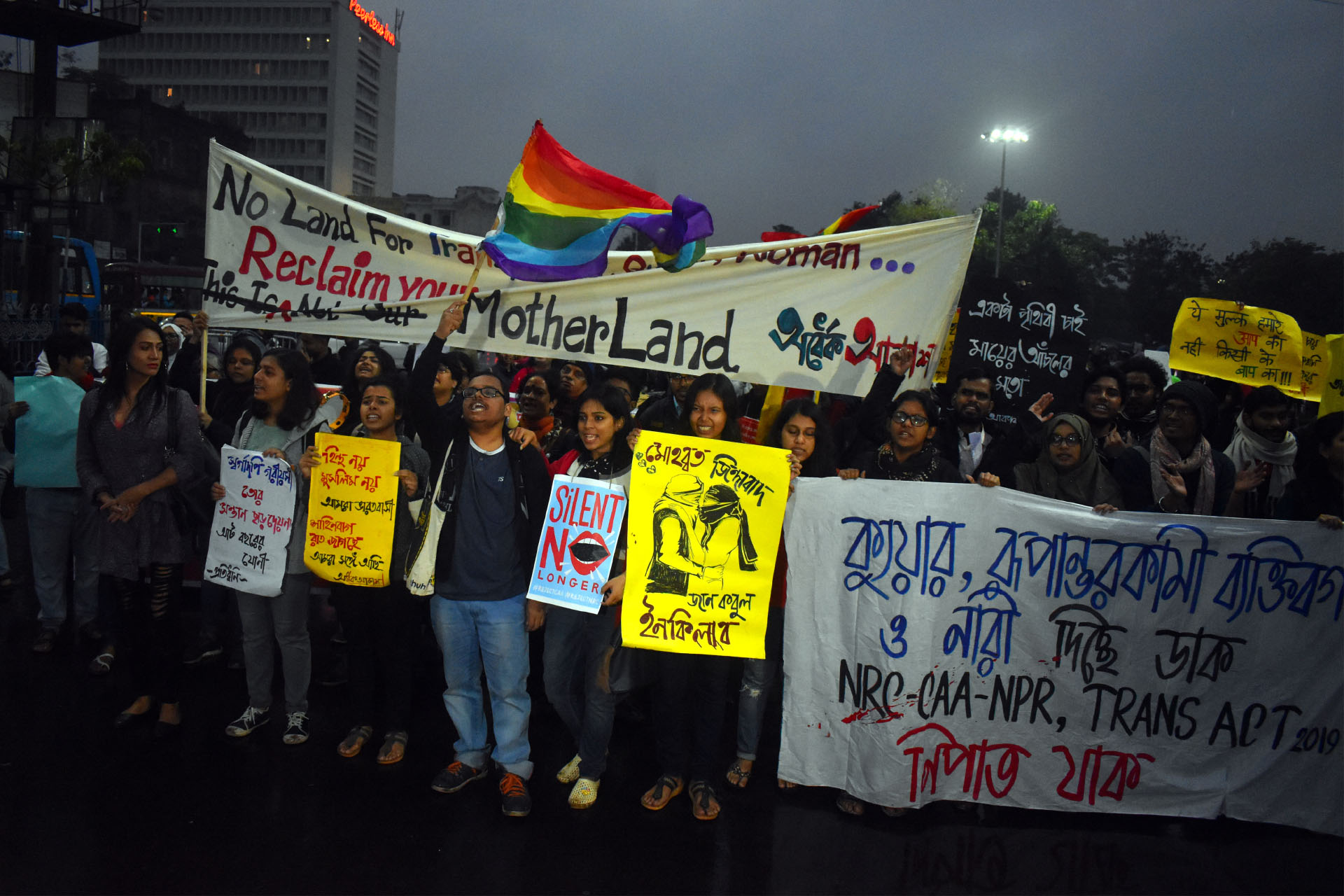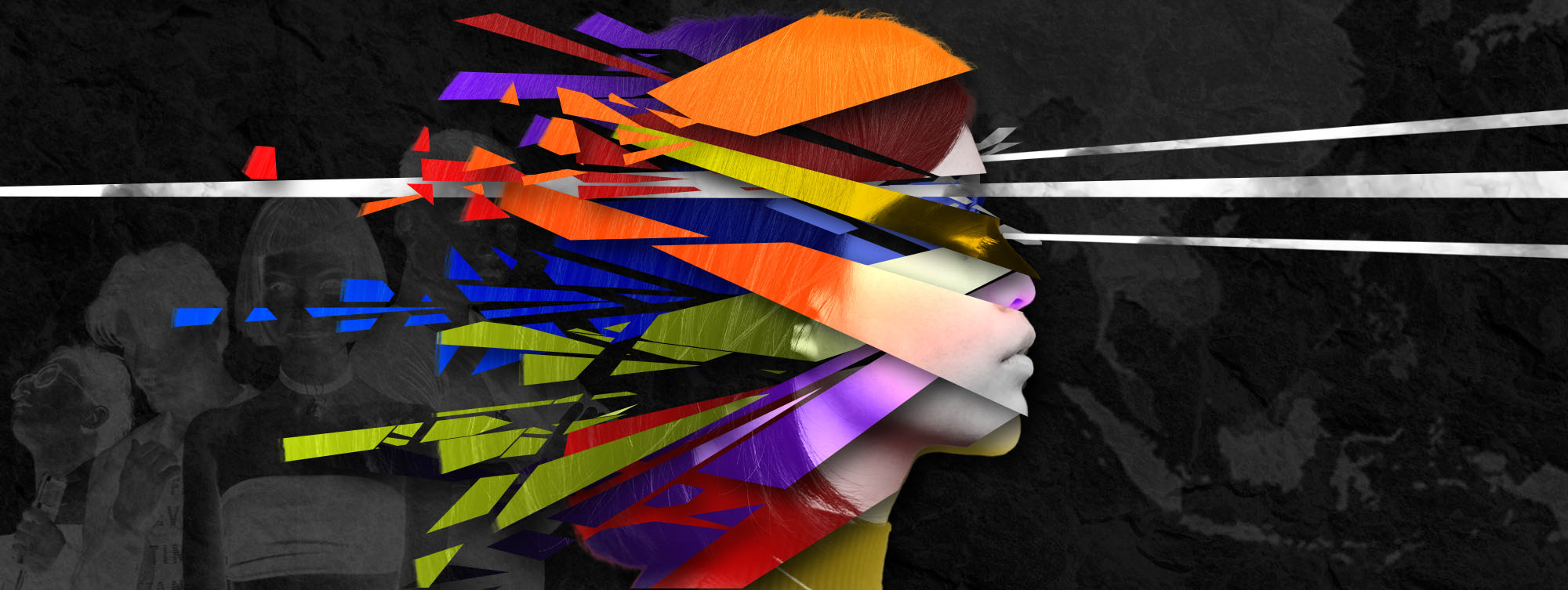|
Getting your Trinity Audio player ready...
|
At a glance:
- Only eight of the 20 countries studied have made significant advances in their LGBTQ+ protection policies over the past decade, with Myanmar, Indonesia, and China taking negative turns in the last few years.
- Exclusionary narratives are on the rise in Southeast Asia, and they are increasingly linked to a national security agenda, which poses a serious threat to LGBTQ+ activists.
- Trans women remain the most vulnerable: four out of five trans women murdered in the last 10 years occurred in just three countries: India, Pakistan, and the Philippines.
It was a blow that may turn out to be very deadly. Last May, a Shariat court in Karachi, Pakistan, struck down major parts of a law meant to protect transpeople, calling the landmark legislation “un-Islamic.” According to the court, transgender people have no right to legal protection, including access to drivers’ licenses and passports, because they cannot self-identify based on their “innermost feelings” and therefore should conform to their genders assigned at birth.
The decision further stated that the provisions gutted out of Pakistan’s Transgender Persons (Protection of Rights) Act of 2018 violate “the right to privacy of females in our society” and that they “pave the way for criminals in society to easily commit crimes like sexual molestation, sexual assault, and even rape against females.”
Pakistani trans activists have condemned the ruling, stating that the government has failed the trans community time and time again. “We are tired of carrying our dead transgender sisters’ bodies into the grave,” said Zara Naz, president of Transgender Rights Consultants Pakistan. “We are tired of the abuse and discrimination.”
 Indeed, even when the law was still intact, trans women in Pakistan were still being killed by the dozen a year. Last year, at least 14 trans women were brutally murdered in Pakistan, making it the most dangerous country in Asia for transpeople in 2022. Activists suggest that the highest Islamic court calling their identities un-Islamic may heighten the violence they face daily.
Indeed, even when the law was still intact, trans women in Pakistan were still being killed by the dozen a year. Last year, at least 14 trans women were brutally murdered in Pakistan, making it the most dangerous country in Asia for transpeople in 2022. Activists suggest that the highest Islamic court calling their identities un-Islamic may heighten the violence they face daily.
Pakistan, however, is not the only country in Asia where laws that moderately protect LGBTQ+ are now being walked back. In fact, legal protections for LGBTQ+ people in Asia now mostly depend on where they live and, more recently, on who is running the country. Put another way, LGBTQ+ people in Asia are being made to play a dangerous game of rainbow roulette, where their lives are on the line.
The good, the bad, and the ugly
While Taiwan’s legalization of adoption for married same-sex couples has received much-deserved attention, the vast majority of LGBTQ+ people in Asia continue to struggle under a mishmash of policies that, at best, tolerate their existence.
Still, within the last decade, many of the most punitive laws in Asia targeting LGBTQ+ people — most of which date back to colonial British rule — have either been repealed or seen a decline in enforcement.
Most recently, the repeal of colonial Section 377A of Singapore’s constitution set off a chain reaction of policy changes that decriminalized homosexuality and ended media censorship of the LGBTQ+ community.
In 2021, Bhutan also repealed a similar law, decriminalizing homosexuality. In 2018, a landmark Indian Supreme Court decision struck down Section 377, which defined homosexuality as “unnatural behavior.” In Hong Kong, a 2023 Court of Final Appeal decision recognized transpeople’s right to self-identify without requiring surgery.
In May, the Supreme Court of Sri Lanka ruled in favor of petitions to decriminalize same-sex activities, clearing the way for legislation to repeal provision 377 and the 10-year prison sentence found in the country’s constitution.
Diverging progress in Asia
Map 1: Ranking of Asian countries in terms of LGBTQ+ equality
Despite half of Asian nations making it to the top 100 countries in terms of gender equality, the region has some of the most repressive laws against the LGBTQ+ community. (Hover over the image to see more details.)
Source: EqualDex
But elsewhere, efforts to pass legislation promoting gender parity have either stalled or been actively thwarted by officials.
Thailand's Supreme Court in 2021 blocked the marriage equality bill that parliament had already passed, despite the country earning billions from LGBTQ+-driven tourism. In Japan, the ruling Liberal Democratic Party (LDP) remains determined not to pass any law protecting LGBTQ+ rights, despite growing public support for such, and with yet another court ruling that the lack of these protections is unconstitutional.
In the Philippines, the SOGIE Equality Bill, which had previously passed a Senate Committee, was sent back last December to a Committee led by an outspoken anti-LGBTQ+ lawmaker. This was resolved in May, but activists, including feminist lawmaker Arlene Brosas, are still lobbying both houses to approve the bill.

Unraveling protections
Part of this trend is being attributed to hegemonic masculinity that is increasingly seen as part and parcel of the rise of populist regimes in Asia. This has been combined with the idea that LGBTQ+ rights are an externalized or Western agenda imposed on the East — an idea that has taken hold in parts of Indonesia, China, the Philippines, and, to some extent, India.
In 2017, following a crackdown on Indonesia’s LGBTQ+ community that led to hundreds of arrests, then Defense Minister Ryamizard Ryacudu even infamously referred to the rise of the LGBTQ+ movement as a “proxy war” that was “worse than a nuclear threat.” Tempo magazine quoted him as saying, “It's dangerous as we can't see who our foes are, but out of the blue everyone is brainwashed — that now the [LGBT] community is demanding more freedom, it really is a threat.”
In a flurry of sweeping constitutional reforms last year, Indonesia’s parliament criminalized what it called “Western culture,” including premarital sex, contraception, and even Marxism. Laws against public indecency are already being weaponized against the LGBTQ+ community, and activists fear that these so-called reforms will only make things worse for them. Already, Indonesia ranks among the countries in the region with the lowest public opinion of trans rights, according to a recent survey.
More recently, President Jokowi Widodo’s son-in-law and Medan City mayor openly declared that his jurisdiction is “anti-LGBT” and denied that gay people exist in the North Sumatran city.
Despite no actual laws prohibiting being queer in Indonesia, except for the provinces of Aceh and South Sumatra, police forces are reportedly routinely targeting LGBTQ+ spaces and arresting them by the hundreds. In August last year, South Sulawesi’s education department issued a memo penalizing “the spread of LGBT ideas, thoughts, and behaviors" in schools.
Meanwhile, in March China introduced an egregious law banning “effeminized portrayals of men” on TV and from streaming on social media. While same-sex activities have been legal in the country since 1997, life has become increasingly hard for LGBTQ+ people under Xi Jinping's watch. Following pronouncements from the president, WeChat banned LGBTQ+ accounts from streaming on its platforms, with Weibo and others following suit. Some onlookers, though, say that this policy is actually targeted against effeminized male figures from popular boy groups associated with South Korea and Japan.
In Malaysia, lawmakers have consistently targeted LGBTQ+ people, even accusing the annual women’s protest last March of being “instigated by the LGBT agenda” in a bid to discredit gender equality. Malaysia is one of the last bastions of legalized homophobia and transphobia in Southeast Asia, where punishments of up to 10 years' imprisonment and lashing are routinely enforced.
Former Prime Minister Muhyiddin Yassin was even known to actively promote 'conversion therapy'; current PM Datuk Seri Anwar Ibrahim has said his government will not be any different. Using ‘techniques’ that range from rights deprivation to corrective rape, conversion therapy is one of the worst violations of individuals’ rights to self-expression. In a rapporteur report, the U.N. Human Rights Committee deemed Malaysia’s strategic plan to ‘end HIV by 2030’ to contain endorsements of conversion therapy, including exorcism.
Transpeople are the primary targets of the most heinous practices of conversion therapy, according to a U.N. report, including corrective rape. When the culture supporting conversion therapy is not explicitly prohibited by law, it can lead to violent acts, says the report. At present, however, only Taiwan, India, and Vietnam have laws that protect transpeople against conversion therapy.

“Threats” to society?
In truth, LGBTQ+ people have been considered not only as “health threats,” but also threats to national security by Asia’s growing number of populist leaders. Since 2021, at least 12 reported attacks on LGBTQ+ activists in Myanmar, Indonesia, and the Philippines were suspected to have been committed under the guise of national security.
In the Philippines last April, union organizer and leader of LGBTQ+ activist group Beglad Alex Dolorosa was murdered with at least 15 stab wounds in Negros City, located in the Western Visayas region. Local activists and BIEN, his union, say that before he was killed, Dolorosa had been experiencing harassment from the Philippine police and army.
Escalating challenges, swelling protests
Source: Armed Conflict Location & Event Data Project (ACLED)
In Myanmar, the junta has imprisoned at least 16 queer activists and killed at least one since taking power in 2021, and is now implementing the previously unenforced criminalization of queer identities. LGBTQ+ activist Sue Sha Shinn Thant, arrested last October, was sentenced to 25 years in prison “for her alleged role in financing anti-regime activities.”
Unsurprisingly, the LGBTQ+ community has been actively campaigning against the junta’s attacks, allying itself with the broader pro-democracy movements. Since 2021, at least 130 such protests in Myanmar have been led by or with the significant participation of LGBTQ+ groups.
A divided public on trans rights in China, Malaysia, and Indonesia
Graph 2: While public opinion is overwhelmingly in favor of trans rights in all 12 countries surveyed in Asia, a significant minority (more than 30%) of populations in Indonesia, Malaysia, and China are opposed to such rights.
Source: IPSOS Global Trends Survey 2023
Transpeople at the frontlines
In many ways, the fight for LGBTQ+ rights is a fight for the very lives of people who identify as LGBTQ+ in Pakistan, Bangladesh, Afghanistan, Malaysia, and some parts of rural India. This is especially true for trans women.
Studies suggest that among the LGBTQ community, transpeople in Asia disproportionately face discrimination and prejudice. They are 2.69 times more likely to be poor, homeless, or at risk of depression than the average person.
Particularly in former British colonies, transgender people are considered taboo and “unnatural.” In some interpretations of Sharia law, cross-dressing, often associated with transpeople, is considered un-Islamic and is condemned socially. During the COVID-19 pandemic, transgender women in Asia experienced higher rates of unemployment and less access to aid and healthcare, according to a report by Amnesty International.
Trans women are also at the highest risk of hate crimes across the region, says the Asia-Pacific Transgender Network. Since 2013, at least 390 transpeople have been killed in the region, with 48 of them murdered in 2021 alone. The number is likely much higher because these were the only ones that the media and communities reported.
Trans murders in Asia since 2008
Graph 3: Cumulatively, India, Pakistan, the Philippines, and Thailand are the deadliest countries for trans women on record.
Source: Asia Pacific Transgender Network
#SayHerName
In the last two years, at least 20 trans women across Asia have been stabbed to death, 21 shot dead, and some 24 tortured by stoning, beaten to death, strangled, or burned alive. At least 78 percent of the reported trans women murdered in the last decade were from three countries alone: India, Pakistan, and the Philippines. Trans women murdered in India and Pakistan were more likely to be maimed and tortured than in any other country in Asia.
Sana, a 29-year-old trans woman from Chennai, India went missing last February. She was found dead with her throat slit; her killers remain at large. In August of last year, a married man in Indore mutilated Zoya Kinnar for being trans after inviting her to his home through social media. Her dismembered body was discovered in two locations: half was in an alley, while her torso was in the perpetrator's house.
Last February in Pakistan’s Swat, Mah Noor was going home from work when her neighbor shot at her car, leaving her dead. Earlier, in June last year, four trans women were shot by men who broke into their home in Khyber Pakhtunkhwa. Sameera, one of the trans women, died immediately from her gunshot wounds; Kaif nearly survived, only to pass away after three months in the hospital.
#SayHerName: Trans deaths dot Asia in the last two years
Map 2: At least 87 trans women were murdered in Asia in the last two years (2021 and 2022) alone (plotted in a timeline in the foregoing graph).
(Hover over the image to see more details.)
Source: Asia Pacific Transgender Network
In Cebu, in the Philippines's Central Visayas region, Elaine Englis and her mother were stabbed to death last March by her abusive partner. News coverage called her “a man” despite relatives and friends reminding media outfits of her gender identity.
Timeline of trans murders in Asia
As affluent Asian countries advance in gender parity, the imperative of uplifting the voices of those who require these protections the most cannot be overstated.
Navigating a patchwork of advances amid attacks and setbacks requires stitching together opportunities for solidarity. In uplifting the most vulnerable, a world of pride without prejudice awaits the struggling LGBTQ+ community of Asia. ◉



















